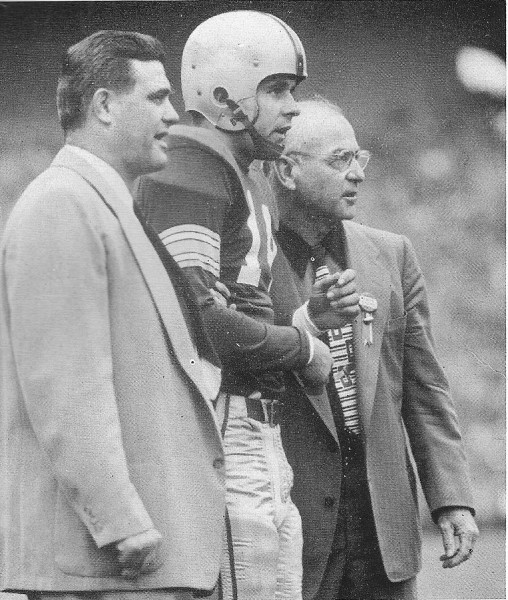This is How Paying it Forward Makes the World a Better Place!
Seeing as how this is college graduation season, at least in the United States, I wanted to share a commencement-related story I heard last week that relates to an idea I have wanted to write about for a while. The idea is one called paying it forward and we will get to it in a little bit, but first I want to share another paying it forward related commencement story.
Let me take you back to March 14, 1986, to the commencement speech given at Ohio State University by its great former football coach Woody Hayes. I will only present the first part that contains the message about paying it forward, but you can read the entire transcript here if you are interested.
The Woody Hayes 1986 Ohio State Commencement Speech
“Graduates, Mr. President, faculty members, friends and families of the graduates who have done so much to make this possible. Today is the greatest day of my life. And, Mr. President, you certainly helped to make it that way. I appreciate it so much being able to come here and talk to our graduating class at The Ohio State University, the great, great University that you and I love. (APPLAUSE)
I am so grateful and so appreciative to be here today, I just can’t tell you how much.
I would like to start out with something that I use in almost every speech, and that is the idea of paying forward.
Paying it forward – that is the thing that you folks with your great education from here can do for the rest of your lives. I was so happy the other day when I saw in the paper about Jim Lachey, who played here one year ago and comes back after one year of professional football to give a six-figure gift to the University. And what he said was, “I received a great education here and I got to play great football under Coach Bruce, and under a great football system here. I want to help some other youngster to do the same thing.”
Take that attitude toward life, because so seldom can we pay back – those whom you owe – your parents and other people – will be gone. Emerson had something to say about that.
He said you can pay back only seldom. But you can always pay forward, and you must pay line for line, deed for deed, and cent for cent. He said beware of too much good accumulating in your palm or it will fast corrupt. That was Emerson’s attitude and no one put it better than he did.
I might mention a couple of people. Jim Lachey is one who is already paying forward. Two weeks ago in Michigan, a former football player of ours passed away. He was in his 60s. He had been in the Marine Corps during World War II, on Okinawa – there were only 30 from his outfit that survived. That made a difference in him. He came back to coaching and he was a great coach. His name was Jack Castignola. He sent his son, Greg, here as one of our quarterbacks. Jack Castignota won nine championships – undefeated season, and all that – but he did something bigger: He coached 126 players who went on to college. One hundred and twenty-six players went on to college and that was his way of paying forward.
We had a great dean of agriculture here by the name of Roy Kottman, who retired a couple years ago. And on his retirement, he and I were having lunch one day in the Faculty Club, and I said, “Roy, how did you happen to go to Iowa State?” “Oh,” he said, “I was working back during the Depression for $1.50 a day pumping gas and I couldn’t save any money. But an old man in that community in Iowa came to me and said, ‘Roy, if you’ll go to Iowa State, I’ll pay your tuition.’ So, I went to Iowa State and worked for my room and board, graduated, went into the service, came back, got my master’s, my doctorate, went to West Virginia as dean of the agriculture college, and then I came to Ohio State.” He was here 23 years, and in those 23 years, he virtually doubled food production in Ohio. On top of that, he graduated thousands of youngsters. On top of that, he helped to feed hungry mouths all over the world. All because that old man back in Iowa said, “Roy, if you’ll go to Iowa State, I’ll pay your tuition.” That’s paying forward…” 1

What Does Paying It Forward Mean?
Most of us are familiar with the concept of paying it back which is where we do something nice for someone else because they have done something nice for us.
Paying it forward means that instead of paying back whoever did a nice deed for us, we instead do a favor or something nice for an entirely different person.
As Charley Johnson, President of the Pay It Forward Association, yes such a thing exists, says:
“Paying it forward is the one thing on this planet that all 7.1 billion people can participate in. The one thing that allows anyone, no matter what their age, race, religious beliefs or where they live, the ability to make someone’s day better. It can be a family member, a friend, a stranger, a customer, maybe someone you see all the time at the gym – whoever you choose. It can happen whenever you want it to: there will never be a shortage of people who need help or even a little cheering up. It doesn’t need to involve money. It doesn’t need to make you feel uncomfortable and it can be done for any reason. This world needs more goodness in it, and any reason – no matter what that is – is a good reason.” 2
That’s Really It!
There is no need to make the concept of paying it forward any more complicated than that!
When someone helps or does something nice for you, pay it forward by helping or doing something nice for someone else!
If we want our kids to grow up to be kind and respectful, we need to set the example and show the way.
And one great way to do that is to teach them the value of paying it forward.
Now for the Story That I Heard Recently
You may have seen it in the news but the commencement speaker at Morehouse College in Atlanta caused quite a stir during his recent speech.
Robert Smith, a billionaire investor, and philanthropist informed the graduating class that:
“We’re going to put a little fuel in your bus. Now I’ve got the alumni over there, and this is a challenge to you, alumni. This is my class – 2019…And my family is making a grant to eliminate their student loans.”
That’s right, you read correctly, according to CBS News, Smith and his family have pledged to donate $40 million to wipe out the student debt of all 400 members of the 2019 graduating class at Morehouse College!

His only request of them?
Yup, you guessed it – all he asked is that they pay it forward.
Until next time, keep paying it forward…and as always…PYMFP!
–Rick
If you enjoyed this post, it would mean the world to us if you shared it with people you care about via any of the social media platforms below!
Use it or Lose It
The concept of paying it forward simply means that instead of paying back whoever did a nice deed for us, we instead do a favor or something nice for an entirely different person.
When to Use It
Anytime, it is always good to engage in the practice of paying it forward.
What Do You Think?
Do you have any good stories relating to paying it forward, either you paying it forward to someone else or you being the recipient of someone else paying it forward? Please share your thoughts in the comments below!
Popular Previous Posts:
Free Trait Theory: When and How to Act Out of Character!
9 Tips for Storytelling: This is How to Tell a Better Story!
How to Act as If to Get Yourself in a Confident Mindset
Being Resourceful: How to Make More Out of What You Have!
References
1 http://www.graduationwisdom.com/speeches/0022-hayes.htm
2 Paying it Forward: How One Cup of Coffee Could Change the World
4 https://www.cbsnews.com/news/billionaire-robert-smith-morehouse-college-students-loans-paid-class-of-2019-commencement-speaker-sunday/

I first encountered the concept of paying it forward in a literal sense, at the toll both of the George Washington Bridge back in my late teens. The toll cost 50 cents, but you could buy a book of 20 coupons for $10. Sure saved time fishing around for quarters in your pocket or the ash tray. I had my toll ticket book ready for the attendant to take one coupon out, but he said that the guy in front of me had already paid my toll. I thought this kind of weird, but told the toll collector to take my coupon anyway and pay for the car behind. I have no idea how long the chain lasted, or even if it did.
I read about the Morehouse College situation. I thought it a interesting idea, but quite a bit unfair. If a graduate had no college debts and owed nothing to the school or the government, he/she may have felt slighted or even been pissed off. When I graduated, I owed nothing. When my daughter graduated, she owed nothing. It’s called careful personal financial planning, something that is not taught in any high school or university. I really hope that the donor is not starting a trend. I predict that a lot of those kids will be expecting a free ride for the rest of their life.
The college should track these graduates job progression for, say the next 10 to 15 years, and then publish the results. How many are working in a profession, such as dentistry, optometry, engineering, accounting, or financial management? How many have blue collar jobs – factory assembly line, highway maintenance, construction, plumbing? How many are working minimum wage jobs – sales clerks, “do you want fries with that”? How many are unemployed or on welfare? How many are dead from a drug overdose?
Hi Dave, Great toll booth story and a perfect example. I have heard stories of people doing similar things in the drive-thru at Starbucks but the baristas don’t like it as it makes their jobs more complicated. Yeah, I there are several ways you can look at the Morehouse College example and I too wondered about those that had no debt. It would be a fantastic study for some psychologist to track both their success in life as you suggest but also how much they pay it forward versus a control group. Thanks for your great thoughts, Rick
Love this! I so agree. Thanks Rick.
Hi Eileen, Thanks for commenting and reading. Yes, if more people paid it forward just imagine how much better the world would be! Take care, Rick